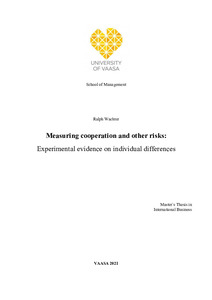Measuring cooperation and other risks : Experimental evidence on individual differences
Wachter, Ralph (2021-05-07)
Wachter, Ralph
07.05.2021
Julkaisun pysyvä osoite on
https://urn.fi/URN:NBN:fi-fe2021050929319
https://urn.fi/URN:NBN:fi-fe2021050929319
Tiivistelmä
This master's thesis examines how the degree of risk influences the cooperative behavior of individuals to understand how cooperation can be better organized. Explicitly, the individual risk preference as compared to the risk level of the environment in which individuals make their decisions. The effect of a social frame on the classical representation of economic games is investigated experimentally. In general, the understanding and identification of critical success factors enable to indicate the cooperation behavior of individuals, but organizations also benefit from the indicated components that require cooperation. Cooperation’s are associated with a high level of risk and pressure. Therefore, it is necessary to carefully study the environmental conditions to get the best result. The aim of this study is to characterize the optimal conditions for the evolution of cooperation and its critical success factors to ensure the success of cooperation and to guarantee operational excellence of the entire process.
This master's thesis is based on an experimental study that collects facts and evidence from different perspectives. This experimental study helps to understand the motives behind cooperation in the Stag-hunt games by comparing different economic gams and two risk preferences elicitation methods with those Stag-hunt games of this study. The Trust game, Ultimatum game, Dictator game, as well as the Holt and Laury price list and the Bomb risk elicitation task, are compared to the Stag-hunt games. Payoffs are manipulated in a two-player one-shot Stag-hunt game. The Payoffs explain the degree of cooperation by combining three motives: Baseline, more efficient, and less risk. In addition, the social framing effect is investigated as a treatment in the experiment. This is implemented as a joint venture scenario. This study helps organizations to better understand how to develop strategies that protect against failure of cooperation. Decision-makers can use the results of this research to carry out cooperation’s from planning, through implementation, to a successful conclusion.
On the one hand, payoff dominance and risk dominance are not significant. However, in the game less risk there is a positive influence on the likelihood of cooperation. On the other hand, the treatment business setting is strongly significant which means that cooperation occurs more often in the joint venture scenario than in the classical representation of the economic games. It positively influences cooperation behavior. This appears to be why previous attempts to explain Stag-hunt games' decisions only with risk attitudes have not been successful. In this study, trust does not significantly influence. However, it could be demonstrated that it is a basic requirement for cooperation.
This master's thesis is based on an experimental study that collects facts and evidence from different perspectives. This experimental study helps to understand the motives behind cooperation in the Stag-hunt games by comparing different economic gams and two risk preferences elicitation methods with those Stag-hunt games of this study. The Trust game, Ultimatum game, Dictator game, as well as the Holt and Laury price list and the Bomb risk elicitation task, are compared to the Stag-hunt games. Payoffs are manipulated in a two-player one-shot Stag-hunt game. The Payoffs explain the degree of cooperation by combining three motives: Baseline, more efficient, and less risk. In addition, the social framing effect is investigated as a treatment in the experiment. This is implemented as a joint venture scenario. This study helps organizations to better understand how to develop strategies that protect against failure of cooperation. Decision-makers can use the results of this research to carry out cooperation’s from planning, through implementation, to a successful conclusion.
On the one hand, payoff dominance and risk dominance are not significant. However, in the game less risk there is a positive influence on the likelihood of cooperation. On the other hand, the treatment business setting is strongly significant which means that cooperation occurs more often in the joint venture scenario than in the classical representation of the economic games. It positively influences cooperation behavior. This appears to be why previous attempts to explain Stag-hunt games' decisions only with risk attitudes have not been successful. In this study, trust does not significantly influence. However, it could be demonstrated that it is a basic requirement for cooperation.
